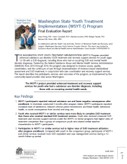This report describes the outcomes of the Washington State Youth Treatment Implementation (WSYT-I) Program. Funded by the federal Substance Abuse and Mental Health Services Administration (SAMHSA) from 2016 through 2019, the program provided evidence-based standardized assessment (GAIN) and substance use disorder (SUD) treatment (A-CRA), in conjunction with care coordination and recovery support services to youth (age 12-18) with SUD diagnosis, including those with co-occurring mental health needs. Self-reported results from post-enrollment interviews indicated that WSYT-I participants had increased rates of abstinence, reduced criminal justice involvement, and experienced fewer health, behavioral health, or social consequences from alcohol and drug use six months after enrollment. Youth who received WSTY-I and similar services were more likely to complete treatment than a statistically matched group of comparison youth who shared similar baseline characteristics to WSYT-I participants. Participation in WSYT-I or similar services also led to increased utilization of SUD outpatient and case management services. We did not find statistically significant differences between the WSYT-I and comparison youth in medical utilization, criminal justice involvement, and employment outcomes.
Report and/or Additional Information:
Categories:
Related Publications:
- 2003 County Profile of Substance Use and Need for Treatment Services (4.52)
- About the King County ICM Pilot Participants (4.63)
- About the Thurston/Mason ICM Pilot Participants (4.62)
- Alcohol and Substance Use among Adolescents in Foster Care in Washington State (4.38)
- Alcohol and Substance Use Among Adolescents in Washington State (4.35)
- Behavioral Health Treatment Needs and Outcomes for Washington Counties (4.95)
- Bringing Recovery into Diverse Groups through Engagement and Support (4.93)
- Characteristics of People with Apple Health and Stimulant Use Disorder Diagnosis in Washington State: Prevalence, Geographic Distribution and Healthcare Service Utilization over Five Years (Fiscal Years 2018 to 2022) (11.279)
- Geographic Distribution of Patients in Washington State’s Medication Assisted Treatment – Prescription Drug and Opioid Addiction Project (9.114)
- Identifying Substance Use and Mental Health Disorders Using an SBIRT Model: Washington State's Experience (11.242)
- Intensive Case Management as a Community-Based Stand-Alone Service (4.71)
- Intensive Case Management within a Supportive Housing Facility (4.70)
- Overdose Deaths among Medicaid Enrollees in Washington State (4.92)
- Prenatal Substance Exposure in Washington State: Prevalence, Treatment, and Other Service Needs (4.116)
- Profile of Substance Use and Need for Treatment Services in Washington State (4.32)
- Substance Use, Substance Use Disorders, and Need for Treatment among Washington State Adults (4.25)
- Sustainability of Screening, Brief Intervention, and Referral to Treatment in Healthcare Settings (4.101)
- Washington State Healthy Transitions Project: Findings from the Impact Evaluation (3.58)
- Washington State Jail-based Opioid Treatment Networks: Disparities in Initiation of MOUD Treatment (4.115)
- Washington State Medication Assisted Treatment – Prescription Drug and Opioid Addiction Project: Year One Performance (4.96)
- Washington State SBIRT Primary Care Integration: Implementation (4.98)
- Washington State’s Medication Assisted Treatment – Prescription Drug and Opioid Addiction Project – Preliminary Outcomes through Year Two (4.102)

